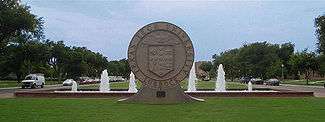Texas Tech University academics

Texas Tech University, often referred to as Texas Tech or TTU, is a public, coeducational, research university in Lubbock, Texas, United States. Texas Tech offers 150 bachelor's, 104 master's, and 59 doctoral degree programs through 11 academic colleges, a graduate school and a school of law.[1]
Colleges and schools
Current
Initially Texas Technological College was separated into four schools: Agriculture, Engineering, Home Economics, and Liberal Arts. In 1933 they were designated as divisions before reverting to schools in 1944. Graduate education began in 1927 within the School of Liberal Arts before a separate Division of Graduate Studies opened in 1935 and renamed as the Graduate School in 1954. A Division of Commerce was formed in 1942; by 1956 it had become the School of Business Administration. The School of Law and the School of Education opened in 1967. In 1968 the agriculture school became the School of Agricultural Sciences. In an answer to student and faculty opinion, the legislature changed the name of Texas Technological College to Texas Tech University on September 1, 1969. Five of the six schools became colleges with only the School of Law retaining its name.[2]
| College or school | Founded | Undergraduate Enrollment |
Graduate Enrollment |
Professional Enrollment |
Total Enrollment |
|---|---|---|---|---|---|
| College of Agricultural Sciences & Natural Resources | 1925 | 1,437 | 348 | — | 1,785 |
| College of Architecture | 1966 | 693 | 130 | — | 823 |
| College of Arts & Sciences | 1925 | 8,902 | 1,297 | — | 10,199 |
| College of Education | 1967 | 795 | 1,041 | — | 1,836 |
| Graduate School | 1983 | — | 529 | — | 529 |
| Honors College | 2002 | — | — | — | — |
| College of Human Sciences | 1925 | 2,834 | 369 | — | 3,203 |
| School of Law | 1967 | — | — | 670 | 670 |
| College of Mass Communications | 2004 | 1,454 | 66 | — | 1,520 |
| Rawls College of Business | 1942 | 3,616 | 677 | — | 4,293 |
| Talkington College of Visual & Performing Arts | 2002 | 959 | 281 | — | 1,240 |
| Whitacre College of Engineering | 1925 | 3,477 | 767 | — | 4,244 |
Former
- University College, 2008–2012. Formerly named "College of Outreach and Distance Education" (2008–2010), and "Division of Outreach & Distance Education" prior to 2008.
Rankings
| University rankings | |
|---|---|
| National | |
| ARWU[3] | 112-137 |
| Forbes[4] | 385 |
| U.S. News & World Report[5] | 159 |
| Washington Monthly[6] | 221 |
| Global | |
| ARWU[7] | 301-400 |
Research
Classified by the Carnegie Foundation as a research university with "high activity",[8] Texas Tech University hosts 60 research centers and institutes.[9]
Resources
Libraries
 | |
|
Southwest Collection/Special Collections Library building | |
| Type | Academic library |
|---|---|
| Location | Lubbock, Texas |
| Branches | 3 |
| Website | https://library.ttu.edu |
The Texas Tech University Libraries is the 3rd largest academic library system in Texas by volumes held and 91st largest in North America with over 2.6 million volumes and 2.7 million microforms, as of 2004.[10] The library system includes three branches: Architecture Library, Southwest Collection/Special Collections Library, and University Library.
Press
Notes
References
- ↑ "The Texas Tech Administration Building". KCBD. Retrieved 2008-08-17.
- ↑ http://www.tshaonline.org/handbook/online/articles/kct32
- ↑ "Academic Ranking of World Universities 2016: USA". Shanghai Ranking Consultancy. Retrieved August 16, 2016.
- ↑ "America's Top Colleges". Forbes. July 5, 2016.
- ↑ "Best Colleges 2017: National Universities Rankings". U.S. News & World Report. September 12, 2016.
- ↑ "2016 Rankings - National Universities". Washington Monthly. Retrieved September 6, 2016.
- ↑ "Academic Ranking of World Universities 2016". Shanghai Ranking Consultancy. 2016. Retrieved August 16, 2016.
- ↑ "Texas Tech University profile". The Carnegie Foundation. 2008-07-01. Retrieved 2008-08-25.
- ↑ "University-Recognized Centers and Institutes". Texas Tech University. 2008-07-01. Archived from the original on 2008-04-24. Retrieved 2008-08-13.
- ↑ "ARL Statistics 2003-2004 — Rank Order By Volumes Held". Association of Research Libraries. Accessed August 12, 2006.
